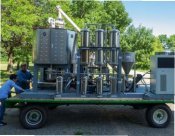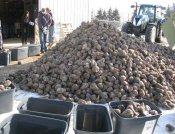The Sun Grant Initiative, through funding from the U.S. Department of Transportation (DOT), administers a competitive research program for land-grant universities and their partners. Each of the five Sun Grant Centers manages its own regional competitive grants program to best meet the challenges of bioenergy and biomass research and education needs within their respective regions. Each Center utilizes approximately 75% of their total funding for competitive grant projects. The remaining funds are used internally to build Center capacity.
Department of Transportation Research Grant Awardees
The U.S. Department of Transportation provided funding for the NCRSGC to administer a competitive research program for land grant universities and their partners in the region. This program concluded at the end of 2017. The NCRSGC Center utilized approximately 75% of the DOT funds for regional competitively selected awards while approximately 25% of the funds were used internally at SDSU to build research capacity.

Working with the Sun Grant Initiative, the DOT Research and Innovative Technology Administration (RITA) organized a team of federal agency specialists to identify the nation’s leading research priorities to be addressed in order to develop renewable bio-based transportation fuels. These national priorities for renewable transportation development included: biofuel feedstock development, biofuels conversion processes, biofuel system analysis, economics, marketing and policy and environmental impacts. Figure 1 highlights the primary topic area of awards made through this program as well as the funding associated with each.

A project at South Dakota Mines developed models to assist in evaluating biofuel production sustainability from nonfood oilseeds for the Northern Great Plains with respect to farm economics, life cycle impacts and transportation efficiency (Figure 2). These models can also be used to explore future biofuel and/or agricultural opportunities. In addition, undergraduate students on this project developed two easy to use ESRI ArcGIS story maps to describe potential use of oilseeds in the region:
- Farm-gate Life Cycle Assessment of Oilseed Feedstocks for the Northern Great Plains
- Biodiesel Transportation Network for the Northern Great Plains

Regional oilseed life cycle inventories been made available within the new USDA Ag Data Commons. Availability of this dataset will assist in meeting future renewable fuel and biofuel regulatory requirements and pathway approvals.

A team led by researchers at the University of Minnesota developed a novel and efficient technology called Rapid Microwave Assisted Pyrolysis (rMAP) for transforming biomass into biofuels. This technology was adapted to smaller, distributed systems with the pilotscale processor fitting on the back of modest-sized trailer (Figure 3). Resynergi Inc. a California waste recovery company, is making use of this technology to commercialize a biorefining technology that converts both biomass and waste plastic into oil and gas Resynergi is broadening the range of feedstocks that could be processed by combining the microwave-based technology developed at the University of Minnesota to convert biomass such as waste wood or crop residue into oil with its own modular, microwave-based system to transform unrecycled waste plastic into biodiesel.
At North Dakota State University, a team of researchers is working to develop energy beets, a nonfood crop, as an economical sugar source to produce biofuels and bioproducts. Specifically, they evaluated ways to increase production of raw thick juice and reduce the transportation and storage challenges associate with energy beets (Figure 4). Their research helped identify the best alternatives to do this through frontend processing, storage and fermentation tests as well as computer modeling. Their interdisciplinary partnership contributed to ongoing efforts by the private and public sectors to establish an energy beet biofuels industry in the North Central U.S.
- Four invention disclosures
- One patent
- Two cultivars with plant variety protection
- Six jobs created
- Training of undergraduate (38), M.S. (30) and Ph.D. (33) students and postdocs (17)
- Nearly 160 peer-reviewed publications
- Thirteen book chapters
- More than 200 presentations to scientific, professional and lay audiences
- Thirteen extension/outreach publications
- Several websites to educate stakeholders about bioenergy
All projects funded through DOT are listed below along with the lead investigator and her/his institution.
- Developing a sustainable feedstock and next-generation processing technologies for biofuels production, W. Gibbons, South Dakota State University.
- Diversifying Midwestern biofuel feedstocks An evaluation of nitrogen-fixing Alnus and Salix germplasm, S. Hokanson, University of Minnesota.
- Novel Recoverable Enzyme Nanoparticles for Cellulose Hydrolysis, P. Johnson, University of Wyoming
- Develop Sustainable Renewable Energy Systems for Practical Utilization of Bulky Biomass, R. Ruan, University of Minnesota.
- Sustainable Cropping Systems for Harvesting Corn Stover for Biomass, K. Moore, Iowa State University.
- Development of Logistics Systems for Sustainable Supply of Herbaceous and Woody Feedstocks, R.V. Morey, University of Minnesota.
- Torrefaction and Pyrolysis of Grasses and Related Biomass to Fungible Fuels, D. Raynie, South Dakota State University.
- Low Moisture Anhydrous Ammonia (LMAA) Pretreatment Process of Corn Stover for Production of Butanol and Integration with Long Term Storage, K. Rosentrater, Iowa State University.
- Biosolar conversion of CO2 and H2O into myrcene by engineered cyanobacteria, R. Zhou, South Dakota State University.
- Energy beets a new industrial sugar source for the production of advanced biofuels, D. Wiesenborn, North Dakota State University.
- Distributed production of DME based fuels using microwave technology and direct catalytic synthesis, R. Ruan, University of Minnesota.
- Evaluation of biomass and bioenergy production, environmental performance and life cycle analysis of prairie cordgrass, S. Kumar, South Dakota State University.
- Improving biomass feedstock transportation efficiency, economics and emissions via real-time decision support tools and best management practices, M. Darr, Iowa State University.
- Bio versus fossil oil: Dryland biofuel feedstock production transportation infrastructure challenges, J. Stone, South Dakota School of Mines and Technology.
- Developing a Prairie Biorefinery, W. Gibbons.
- Annual Updating of the Spatial Extent of Feedstock Agriculture, M. Hansen.
- Oil Extraction from Non-Food Oilseeds for Renewable Fuel Production, K. Muthukumarappan.
- Bio-Oils from Oilseed Byproduct Feedstock, S. Gent.
- Oil Extraction from Oilseeds for Renewable Aviation Fuel Production, L. Wei.

